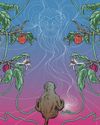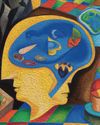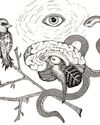
Many of the central themes and concepts of existentialism – freedom, choice, responsibility, bad faith, anxiety, despair, and absurdity – originated in the writings of Søren Kierkegaard (1813-55), in such ground-breaking works as Either-Or (1843), Fear and Trembling (1843), The Concept of Anxiety (1844) and The Sickness Unto Death (1849). Existentialism is undoubtedly as much rooted in Kierkegaard’s militant, idiosyncratic Christianity as it is in the ‘God is dead’ proto-existentialism of Arthur Schopenhauer and Friedrich Nietzsche. But his radical views on faith, religious commitment and the individual, and his rejection of a conformist, passive, rationalist, dispassionate, inauthentic approach towards the religious life and the infinite, make him a true existentialist. Here we’re going to briefly look at his concept of anxiety.
Esta historia es de la edición August/September 2021 de Philosophy Now.
Comience su prueba gratuita de Magzter GOLD de 7 días para acceder a miles de historias premium seleccionadas y a más de 9,000 revistas y periódicos.
Ya eres suscriptor ? Conectar
Esta historia es de la edición August/September 2021 de Philosophy Now.
Comience su prueba gratuita de Magzter GOLD de 7 días para acceder a miles de historias premium seleccionadas y a más de 9,000 revistas y periódicos.
Ya eres suscriptor? Conectar

Anselm (1033-1109)
Martin Jenkins recalls the being of the creator of the ontological argument.

Is Brillo Box an Illustration?
Thomas E. Wartenberg uses Warhol's work to illustrate his theory of illustration.

Why is Freedom So Important To Us?
John Shand explains why free will is basic to humanity.

The Funnel of Righteousness
Peter Worley tells us how to be right, righter, rightest.

We're as Smart as the Universe Gets
James Miles argues, among other things, that E.T. will be like Kim Kardashian, and that the real threat of advanced AI has been misunderstood.

Managing the Mind
Roger Haines contemplates how we consciously manage our minds.

lain McGilchrist's Naturalized Metaphysics
Rogério Severo looks at the brain to see the world anew.

Love & Metaphysics
Peter Graarup Westergaard explains why love is never just physical, with the aid of Donald Davidson's anomalous monism.

Mary Leaves Her Room
Nigel Hems asks, does Mary see colours differently outside her room?

From Birds To Brains
Jonathan Moens considers whether emergence can explain minds from brains.